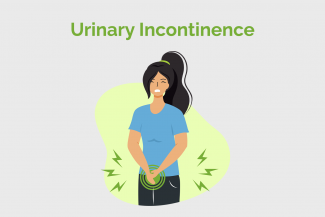Urinary Incontinence affects twice as many women as men and 50 per cent of elderly women suffer from it. It may affect younger women too.
Urinary incontinence can be caused by daily habits, underlying medical or physical problems. It may be temporary or persistent.

Types of Urinary incontinence
a) Stress incontinence: Urine leaks out when you exert pressure on your bladder by coughing, sneezing, laughing, exercising or lifting heavy objects.
b) Urge incontinence: You have a sudden intense urge to urinate followed by involuntary loss of urine. This may be caused by a minor condition such as infection or by a more severe condition such as neurological disorder or diabetes.
c) Overflow incontinence: This type occurs when you urinate but do not completely empty the bladder. Later you may lose some urine.
d) Functional incontinence: A physical or mental impairment keeps you from making it to the toilet in time.
e) Mixed incontinence: You experience more than one type of urinary incontinence.
Changed
13/Oct/2015
Condition












